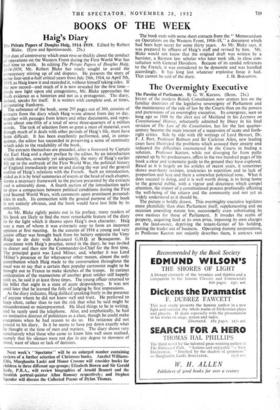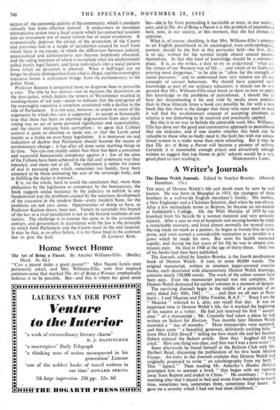The Overmighty Executive
The Passing of Parliament. By G. W. Keeton. (Benn. 21s.)
STUDY of the modern British Constitution now centres less on the familiar doctrines of the legislative sovereignty of Parliament and the maintenance of the rule of law by the Courts than on the powers and pretensions of an overmighty executive. Its emergence, seen so long ago as 1888 by the alert eye of Maitland in his Lectures on Constitutional History, reluctantly admitted by Dicey in his final revision of The Law of the Constitution, has for the last quarter- century become the main interest of a succession of acute and forth- right critics. Side by side with tht writings of Lord Hewart, Dr. F. J. Port, Professor Robson and Sir Carleton Allen, new leading cases have illustrated the problems which aroused their anxiety and indicated the difficulties encountered by the Courts in finding a solution. Professor Keeton, while not diverging far from paths opened up by his predecessors, offers in the two hundred pages of his book a clear and systematic guide to the ground they have explored. Based as it is largely on his articles of recent years, it sometimes shows over-hasty revision, tendencies to repetition and to lack of proportion and here and there a somewhat polemical tone. What it does succeed in doing, and it is well worth doing, is to bring home to the general public, with a vigour and directness which compel attention, the import of a constitutional process profoundly affecting the well-being of the citizen and the community and not yet as widely understood as it should be.
The picture is boldly drawn. This overrnighty executive legislates more plentifully than does Parliament itself, supplementing and on occasion amending statute law, occasionally even substituting its own motives for those of Parliament. It invades the realm of property, acquiring land at its own price, imposing its own charges on the land-owner, depriving the tenant-farmer of his holding, putting the trader out of business. Operating dummy corporations, as Professor Keeton not unjustly describes them, it annexes vast sectors of the economic activity of the community, which it conducts virtually free from effective control. It endeavours to introduce retrospective action into a fiscal system which has converted taxation into an instrument not of social reform but of social revolution. It systematically deprives the citizen of the protection of the Courts and enmeshes him in a tangle of jurisdiction created by itself from which there is no escape, in which the differences between judicial, quasi-judicial and administrative acts become hopelessly obscured, and the ruling intention of which is to exclude what are tendentiously called purely legal factors, and force individuals into a social pattern from which no deviation is allowed. What is half-legal can no longer be clearly distinguished from what is illegal, and the overmighty executive forms a convenient bridge from the parliamentary to the police State. Professor Keeton is concerned more to diagnose than to prescribe a cure. The title he has chosen—not to mention the decoration on the dust-jacket, which depicts the towers of Westminster swathed in winding-sheets of red tape—seems to indicate that the emergence of the overmighty executive is somehow associated with a decline in the role of Parliament. It is not easy, however, to assent to some of the arguments by which this view is supported : to accept as historically true that there has been an electoral degeneration from days when voting was an act of some personal significance and responsibility, and the elector immune from corruption ; to agree that Cabinet control is quite so absolute as made out, or that the Loixis acted mainly as a brake on over-hasty legislation. It is moreover no real indication of decline that Parliament should become the means of revolutionary change ; it has after all done some startling things in its time. Nor can one readily admit that there has been a conscious and successful bureaucratic conspiracy against it ; few of the aims of the Fabians have been achieved in the full and systematic way they intended, and many not at all. The indictment is rather for excess of zeal in pursuing aims which, sometimes too 'hastily, have been assumed to be those animating the acts of the sovereign body, and in fulfilling the duties it imposed.
It is, on the whole, hard to avoid the conclusion that, more than abdication by the legislature or conspiracy by the bureaucracy, the book suggests undue hesitancy by the judiciary to rethink in any fundamental way the problems created by the necessary development of the executive in the modern State—every modern State, for the problems are not ours alone. Opportunities of doing so have, as Professor Keeton shows, been lost. Tamely to surrender this branch of the law to a rival jurisdiction is not in the historic tradition of our nation. The challenge is in essence the same as in the seventeenth century, and government in accordance with the law is the principle to which both Parliament and the Courts must in the end respond. It may be that, as so often before, it is for those bred in the common



































 Previous page
Previous page